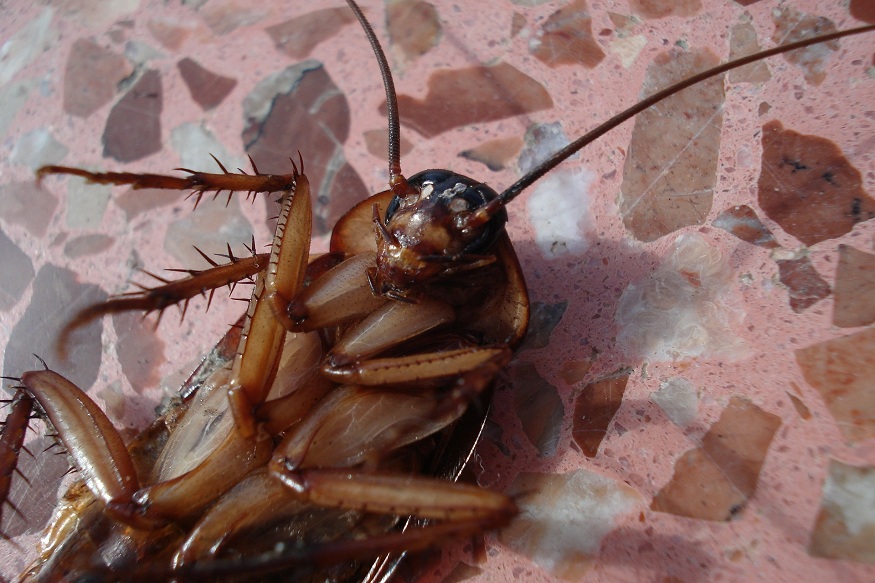Though it can be something out of a horror film, the eerie sight of a headless cockroach running around is based on biology. These tenacious insects have been known to be among the most difficult pests to kill.
For people suffering from a cockroach infestation, the mere thought of them could make you shiver. The thought of an infestation can seem like an endless task.
Many studies on these pests reveal their survival skills as one of the most startling, especially their ability to survive for days, even weeks, without their heads.
Let’s explore the science behind the cockroaches’ resilience and how this could help with roach control.
The Biology of a Cockroach: Built to Last
Thanks to their distributed neural system, cockroaches are biologically evolved for survival. Unlike most mammals and humans, cockroaches do not depend entirely on their brains for fundamentally vital body functions.
Actually, the neural ganglia are spread all across their body and control many of the things they do, including walking, breathing, and even reproduction. So, unlike most creatures, losing their head does not mean instant death for them.
Another important fact is that cockroaches don’t breathe through their mouths or nostrils. Rather, they get oxygen straight through their tissue fibres by little holes called spiracles down the sides of their bodies.
Having such a body structure and the lack of a head does not limit their capacity to keep on living, at least temporarily. This makes them, in some respects, the perfect survivalists.
Because of their open circulatory system, cockroaches also have blood circulation that differs from mammals. It doesn’t flow through veins or arteries.
So, there is no noticeable blood pressure reduction in a cockroach when it loses its head, which would cause instantaneous death. They can move about, scamper into dark nooks, and escape predators for a shockingly long time without a head.
Headless, But Not Lifeless: How Long Can They Last?
It’s an interesting yet disturbing sight, seeing a cockroach without its head. The secret is in how its body operates without its head. A headless cockroach can live for roughly a week without its centralised brain, which is necessary for the control of its fundamental functions.
This length is not random, and it directly relates to the roach’s ability to live off of its stored energy and moisture. Though it takes time for that to happen, the insect will finally die from thirst without a mouth.
We must look at how necessary hydration is for the roach, and then we can understand why they finally die after a while. When it comes to food shortage, cockroaches are especially resilient, but moisture is vital to their survival.
If they are unable to keep moist, their bodies start to gradually dry out and cause dehydration. Since cockroaches can conserve water to a high degree, they retain liquids for a week or more. They manage to live on for an astonishingly long period until nature catches up with them, even without a head.
Why Is This Important for Roach Control?
Though it seems like a fun fact, knowing how cockroaches can survive without their heads offers important information for pest management. The difficulty of roach infestations is a well-known fact. Their capacity to survive under harsh conditions only makes managing them more difficult.
Understanding their biology will help to customise more successful pest control strategies.
The distributed nervous system of cockroaches and their tough nature suggest that merely spraying them and hoping for the best won’t be enough.
Most roaches can tolerate small doses of insecticides and can even adapt to the chemicals over time. Professionals can combine baits, gels, and insect growth regulators (IGRs), which target several parts of their biology to fight this.
Accuracy in pest management is highlighted by the cockroaches’ capacity to survive without essential components like their head and their resistance to most damages. Stomping or swatting is not going to fix the issue. Expert pest control companies target the whole colony, not just individual cockroaches, by using poison and traps.
Cockroaches are quite flexible in harsh surroundings. They can survive for a long time without food or water since they survive in conditions when both are scarce. Eliminating any possible food and water sources and blocking out entry points to your home should be the main priorities of roach control. This lowers the welcome of your living space for these undesirable visitors.
Given their capacity to survive in hostile environments, cockroaches are quite likely to develop resistance to specific chemicals. Integrated pest management (IPM) methods, which mix several pest control techniques. To stop their resistance from developing, this includes physical obstacles, natural predators, and they alternate between several types of pesticides.
Professional Roach Control Solutions
Although DIY techniques like traps and bug sprays may somewhat help with the cockroach infestations. Professional cockroach control usually provides more efficient and long-term solutions. Professionals use their understanding of the biological elements that influence the roaches’ survival strategies to their benefit.
Experts use roach baits because they draw roaches to eat a poison which they then take back to the nest, potentially eradicating a lot of the colony. This approach takes advantage of cockroaches, where they often share food, distributing the poison more effectively.
Integrated Pest Management (IPM) focuses on long-term prevention over short-term solutions. Using IPM, pest management experts will find out why you have cockroaches and address issues like hygienic standards, food and water access, and possible nesting locations. This strategy guarantees that the cockroaches remain gone.
Insect Growth Regulators (IGRs) work by interfering with the cockroaches’ ability to develop and reproduce rather than by killing them completely. Targeting the younger roaches helps IGRs to stop the ongoing spread of the infestation. When combined with other treatments, this is a quite successful approach.
Keeping Roaches Out: Prevention is Key
Cockroaches have a tendency to return even after professional extermination. Then, prevention becomes as crucial as treatment.
The smallest crevices and openings allow cockroaches to enter your home. By closing these possible access points around windows, doors, and pipes will greatly increase the likelihood that they won’t re-enter your house.
Cockroaches enter houses in search of food and water. Maintaining clean kitchens, regularly wiping off counters, vacuuming flooring, and fast spill clean-up will help to discourage them. Remember to routinely dispose of trash and store food in sealed containers.
Although cockroaches may survive for long periods of time without food, they require water to survive. Therefore, any moisture source should be removed. Fix faulty taps and make sure there are no standing puddle surrounds.
A Final Thought
Another evidence of how nature has evolved these pests to be masters of survival is their ability to survive without their heads.
Although this information may seem a bit much for homeowners that are battling infestations, the good news is that even the toughest roaches may be eliminated with the correct pest management methods.
The secret is to understand their biology and use that knowledge to create working and long-lasting solutions. Professional pest control combined with careful housekeeping will help you maintain your house roach-free.

